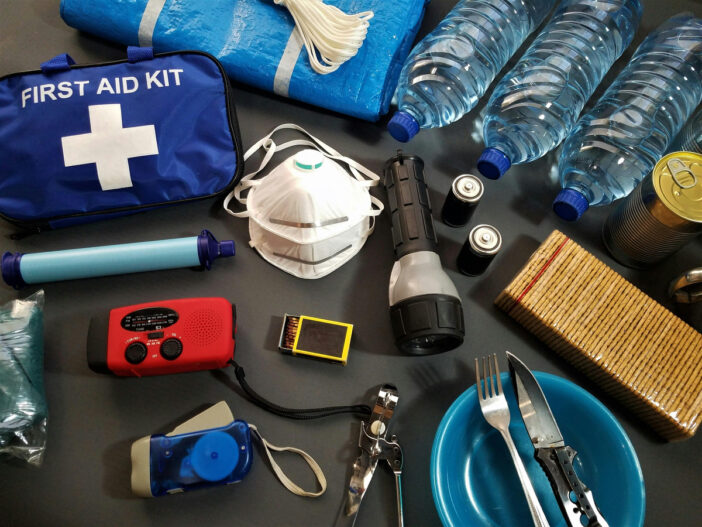The New Year has arrived, and here’s hoping your resolutions are on track and intact.
In the midst of looking to the coming year, it is important for residents to take stock of their preparedness, safety and planning. We have a few suggestions for resolutions that will help you be prepared for times when disaster might strike, in the virtual or the physical world.
With those thoughts in mind, Orange County’s award-winning public safety websites, SafeOC and ReadyOC are constantly updated to promote public safety, awareness, and readiness. ReadyOC provides deep dives into four important areas of preparedness: Ready to React, Ready at Home, Ready at Work, and Ready for the Road.
SafeOC grew from “If You See Something Say Something,” the U.S. Department of Homeland Security’s (DHS) national anti-terrorism public awareness initiative. The site has expanded to include cybersecurity information to protect users and consumers on the internet.
ReadyOC is Orange County’s emergency preparedness site “aimed at educating and empowering Orange County residents, businesses, and the community to better prepare for emergency situations.”
Here are some New Year’s resolutions to consider.
- Examine your cyber hygiene.
The costs of cyber crime continue to spiral, with estimates to the U.S. and global economy ranging from hundreds of millions to tens of billions of dollars annually, and accelerating.
The majority target corporations, utilities, and larger entities, but there is a growing trickle-down effect. The main goal for cybercriminals is to acquire information such as names, passwords, and financial records, which are then sold on the dark web or used to steal directly from victims.
However, simple steps can be taken to add a level of security.
- Invest in a respected antivirus and malware detection system.
- Use two-factor authentication (2FA) or multi-factor for your log-ins. These add a layer of protection beyond your username and password.
- Keep hard drives clean by reformatting and wiping them.
- When your device alerts you to an update, install the update.
- Change your passwords
We all know the danger of using the same passwords across sites, but most do it anyway.
Have different strong passwords on every account, especially on personal email. A number of companies provide “vaults” where passwords can easily be stored and retrieved. Many will also create unique strong passwords for you to store in the vault.
Remember, a “strong” password should have upper and lower case letters, numbers, and symbols. And each should be unique.
- Be wary
Be wary when conducting online transactions. A healthy dose of skepticism and common sense can save you time and money. Scammers bank on people’s eagerness to snap up good deals.
- Delete solicitations by companies or businesses you didn’t expect to hear from, especially via email. Phishing and related scams remain the most common schemes, with criminals posing as legitimate companies sending out mass fake emails and text messages.
- Only buy from secure sites with SSL encryption. These are URLs starting with https (rather than http) and contain a lock icon in the upper left corner of the toolbar. Even these can be spoofed, so remain careful.
- If a seller requests funds be wired directly to them via a money transfer company, prepaid card, or bank-to-bank wire transfer, it’s a big red flag. Money sent these ways is virtually impossible to recover.
- A credit card is still the safest way to pay for an online purchase because most have built-in protections. Alternatively, use a reputable third party vendor such as PayPal or Venmo. Do this independently rather than using a vendor’s link. Never give a seller direct access to your savings or banking accounts.
- Watch your children well
Keeping an eye on kids and their online activity should remain a concern. Parents should resolve to find strong and easy-to-navigate parental control apps for devices. Modern parental apps can help monitor activity through web filters, location tracking, keystroke tracking, screen recording, and other methods.
- Understand threats on gaming platforms
Gaming platforms, chat rooms, and social media are great venues to have fun, interact, compete, and socialize. And they have become havens for pedophiles, bullies, scammers, and even extremist and terrorist groups.
To combat these dangers, resolve to understand the threats. Websites like SafeOC have released guidelines for parents to combat the dangers of online gaming. At the end of the day it is the duty of parents, advisors, and peers to protect children and each other.
Dozens of sites share safety tips that parents and their children can peruse together.
- See Something, Say Something
If you suspect a person means harm to others or themselves, inform officials. Authorities say clues, hints, and outright declarations come out ahead of a tragedy, but these hints can only be acted upon if someone speaks up and does the right thing.
For this reason, If You See Something Say Something applies, especially online.
When you see something online that leaves you uneasy about a person or circumstance, listen to that inner voice. If you observe someone or something suspicious that may be related to terrorism or criminal activity, report it and let law enforcement check it out.
In an emergency, call 911. If the threat is not immediate, you can contact a police department or a number of organizations that accept tips. Information can be provided anonymously or online, although it is always best to step forward in person.
- Be alert
Being tied into local and developing emergencies is important. Sign up with the AlertOC website. A mass notification system operated by the County of Orange in conjunction with local cities, the site is designed to keep residents and businesses informed of emergencies that may require immediate action. Those signed in receive time-sensitive voice or text messages from the county or city in which they live or work on home, cell, or business phones. Messages can also be sent to email accounts and TTY devices.
The State of California has its Governor’s Office of Emergency Services (Cal OES) at www.caloes.ca.gov and www.listoscalifornia.org. Like ReadyOC and AlertOC, the state’s websites are repositories of information about disaster awareness and preparedness.
Sign up for the ReadyOC newsletter and the SafeOC newsletter to receive local updates, public safety alerts, and tips.
 Behind the Badge
Behind the Badge



